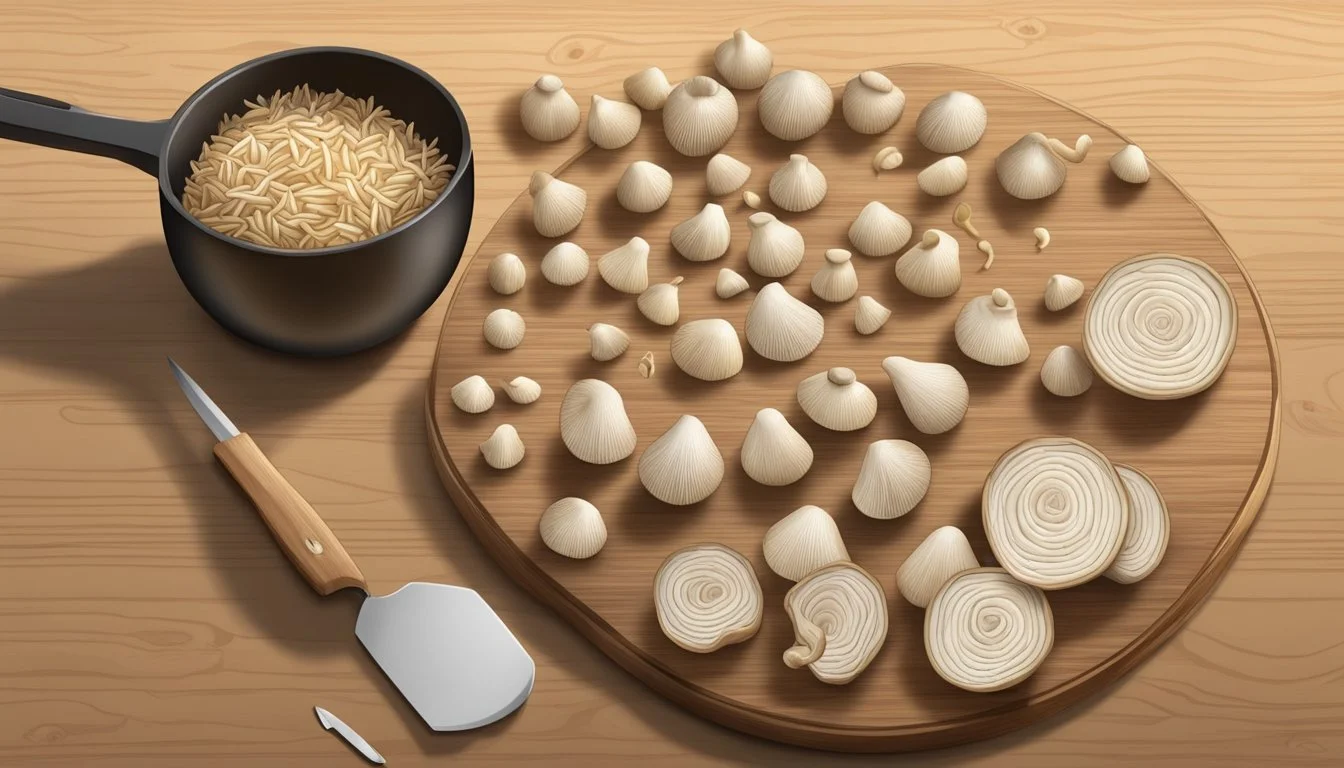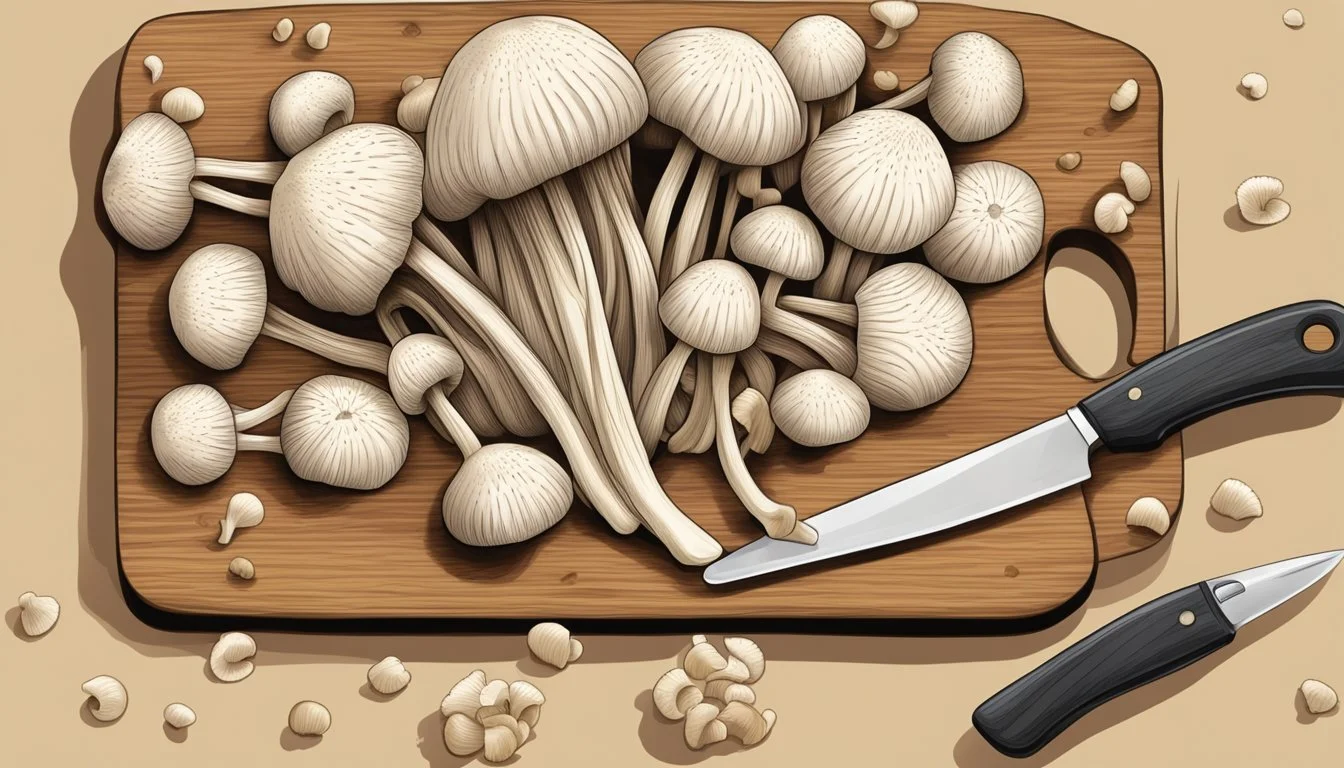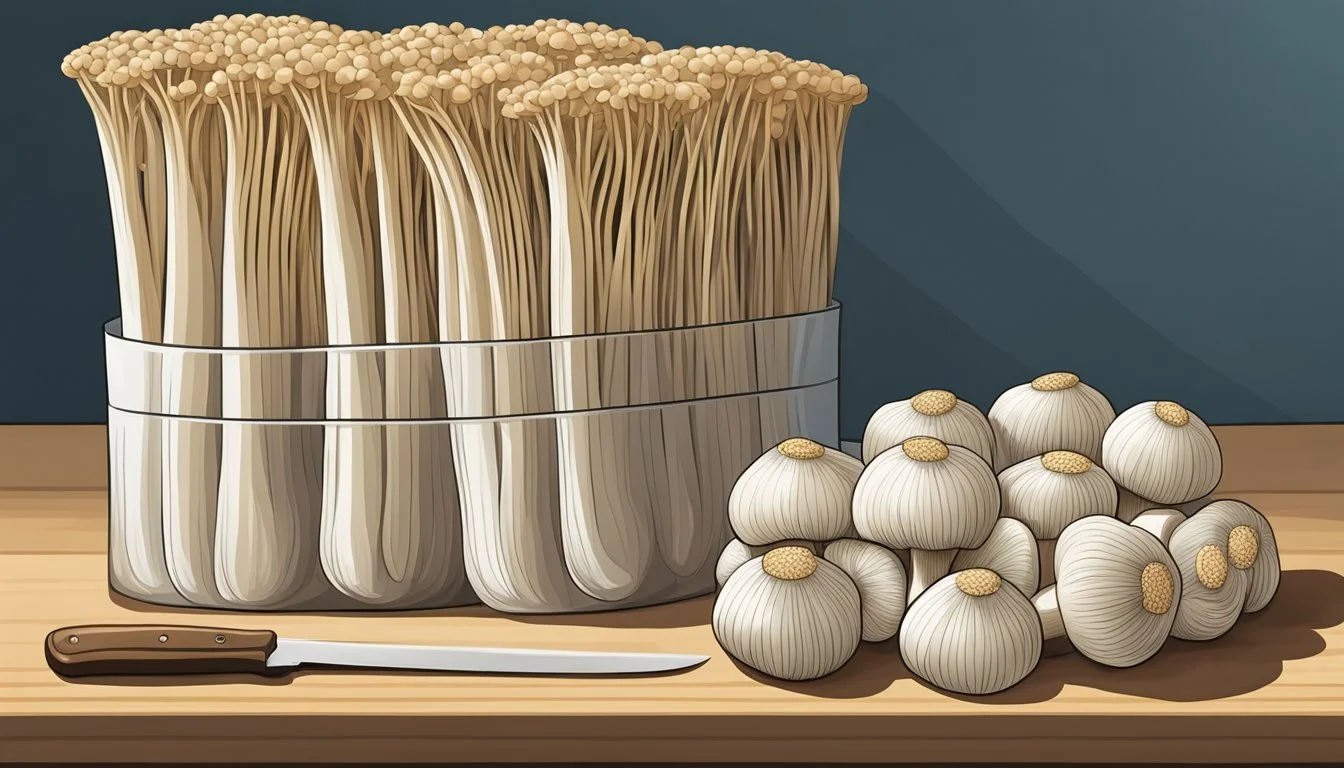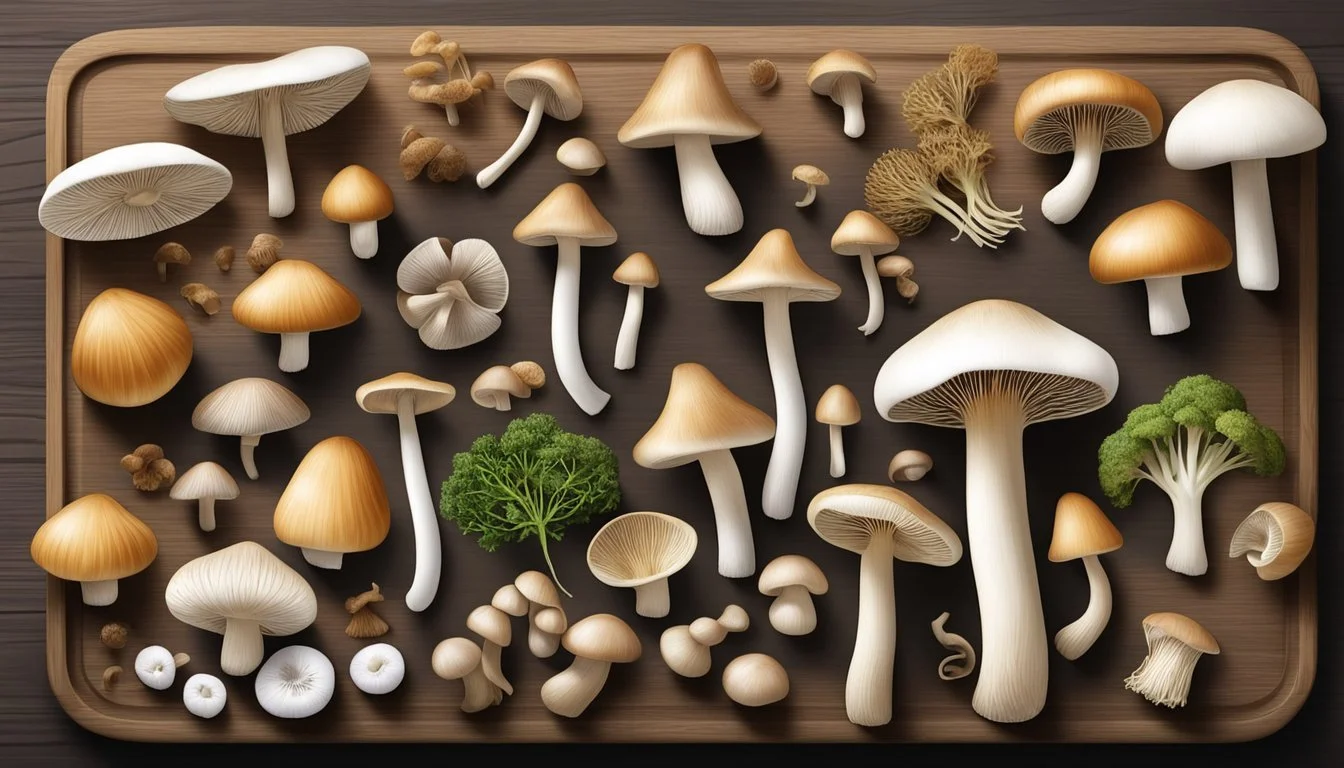Enoki Mushrooms Substitutes
Best Alternatives for Recipes
Finding the perfect substitute for enoki mushrooms can elevate any recipe, especially when these delicate ingredients are hard to find or don't match everyone's taste preferences. Common substitutes such as beech mushrooms, oyster mushrooms, and white button mushrooms offer a similar texture and flavor, making them ideal for soups, stews, and salads. Non-mushroom options like bean sprouts also provide a great alternative for those who seek a different texture or have dietary restrictions.
In Asian cuisine, enoki mushrooms are known for their delicate texture and mild flavor, enhancing a range of dishes. For veggie or noodle stir-fries, any type of mushroom with a delicate texture can work well, like maitake mushrooms. They share a similar taste and texture, ensuring that the dish retains its intended balance and depth.
When selecting a substitute, it is important to consider the specific role enoki mushrooms play in your recipe. Whether you're aiming for a similar taste, texture, or nutritional value, knowing your options will help you maintain the essence of your dish. Boldly explore these substitutes to keep your culinary creations both authentic and satisfying.
Understanding Enoki Mushrooms
Enoki mushrooms, known for their light and crunchy texture, are popular in Asian cuisine. They offer a mild flavor and are often used in a variety of dishes such as soups, salads, and stir-fries.
Characteristics of Enoki Mushrooms
Enoki mushrooms have long, thin white stems topped with small, delicate caps. They are also known as golden needle mushrooms in China and are appreciated for their crunchy texture and mild flavor. Unlike many other mushrooms, enoki retains a somewhat crisp texture even after being cooked.
They are typically grown on logs or sawdust and are available year-round. Fresh enoki mushrooms are usually found in clusters and should be stored in a cool, dry place to maintain their quality.
Nutritional Profile
Enoki mushrooms are low in calories but rich in essential nutrients. They contain a significant amount of protein and dietary fiber, making them a healthful addition to any diet.
They also offer important vitamins such as B vitamins and minerals like phosphorus and iron. Moreover, enoki mushrooms are valued for their potential health benefits, which may include supporting cholesterol management and helping maintain healthy blood pressure levels.
Culinary Uses in Dishes
Enoki mushrooms are versatile and can be used in various culinary applications. They are often sought after in Asian cuisine for their ability to absorb flavors while maintaining a pleasant texture.
These mushrooms are commonly added to soups and stews to provide a light, crunchy element. In salads, they offer a refreshing bite. Enoki mushrooms are also popular in ramen and sushi dishes. For those who enjoy stir-fries, enoki mushrooms can be an excellent ingredient, adding both texture and a subtle, sweet flavor to the dish.
Enoki Mushroom Substitutes
Enoki mushrooms, known for their delicate texture and subtle flavor, may not always be available. Fortunately, various substitutes can replicate their unique traits in different dishes effectively. Below, each subsection focuses on particular substitutes based on texture, flavor, and specific culinary uses.
Ideal Substitutes for Texture
Substituting enoki mushrooms for texture involves finding options that can imitate their crunch and lightness. Bean sprouts are an excellent choice due to their similar crunchy texture and mild taste. They work well in salads and stir-fries.
Golden needle mushrooms are closely related to enoki and share a similar structure, making them another ideal swap in most recipes requiring enoki.
Bamboo shoots provide a delicate, crunchy texture that can stand in for enoki mushrooms in various dishes, especially in soups and stir-fries.
Alternatives for Flavor
When it comes to flavor, finding mushrooms that can mimic enoki’s subtlety is key. Oyster mushrooms have a mild flavor that complements most recipes needing enoki mushrooms. They also absorb the flavors of sauces and spices well.
Shiitake mushrooms offer a richer, more umami flavor but can be used when a stronger, more earthy taste is desired. They are suitable for soups and casseroles.
For those who prefer a milder but still distinct flavor, button mushrooms can serve as an acceptable alternative. Their neutral taste makes them versatile in various dishes, from salads to pasta.
Substitutes in Specific Dishes
In soups, bean sprouts add the necessary crunch and mild flavor, making them ideal replacements for enoki mushrooms. They retain texture even when simmered.
For stir-fries, oyster mushrooms are perfect due to their soft texture and ability to soak in flavors without overshadowing other ingredients. They blend well with vegetables and sauces.
In salads, bamboo shoots can replace enoki mushrooms. They provide a similar crunch and are refreshing in cold dishes.
In casseroles and pasta dishes, shiitake mushrooms can be a good substitute for their deeper flavor and ability to hold up well under lengthy cooking times. They infuse the dish with a rich, earthy taste.
Choosing the right enoki mushroom substitute depends on the recipe's requirements, whether it's texture, flavor, or a specific culinary application.
Common Mushroom Varieties as Substitutes
Enoki mushrooms are unique in texture and flavor, but several other mushroom varieties can serve as effective substitutes. Each alternative offers distinct characteristics that can complement a variety of dishes.
White Button Mushrooms
White button mushrooms, or Agaricus bisporus, are known for their mild flavor and versatile use in cooking. They can be found easily in most grocery stores.
They have a firm texture that works well in soups, stews, and salads, providing a slight crunch similar to enoki mushrooms, though less delicate. White button mushrooms are also a good fit for stir-fries, offering a neutral backdrop to soak up other flavors in the dish.
Cremini Mushrooms
Cremini mushrooms, often referred to as baby bellas, share a similar growth habit with enoki mushrooms, thriving in cool and damp environments. They possess a rich, earthy taste and meaty texture.
These mushrooms bring a robust flavor, making them a suitable substitute for enoki in hearty stews and sauces. They are versatile and can be used in stir-fries, delivering an umami punch that enhances the overall dish.
Portobello Mushrooms
Portobello mushrooms are actually mature creminis, offering a robust, earthy flavor and a meaty, firm texture. They are significant in size, making them an excellent meat substitute in many dishes, especially when grilled.
Portobellos hold up well under high heat, making them perfect for grilling or broiling. Their texture and flavor profile can enhance a variety of dishes, such as sandwiches and stuffed mushrooms.
Oyster Mushrooms
Oyster mushrooms have a delicate, tender texture and a slightly sweet taste with a hint of seafood-like flavor. They are versatile and can be used in most recipes calling for enoki mushrooms, such as stir-fries and soups.
They work well in Asian cuisine and are excellent when sautéed or grilled. Their unique texture absorbs flavors well, providing a pleasant mouthfeel and complementing various dishes.
Shiitake Mushrooms
Shiitake mushrooms have a rich, umami flavor and are common in Asian cuisine. They can be used fresh or dried, with dried shiitakes offering a more concentrated taste.
They are a fantastic substitute in sauces, stir-fries, and soups, adding depth to the dish. Shiitake mushrooms have a slightly chewy texture that can mimic the bite of enoki mushrooms in some recipes.
Other Alternative Substitutes
In searching for substitutes for enoki mushrooms, there are several non-mushroom options, protein-based alternatives, and unique edible fungi that can be used depending on the desired texture and flavor needed for your dish.
Vegetable Substitutes
Zucchini: Thinly sliced zucchini can mimic the texture of enoki mushrooms. It cooks quickly and has a mild flavor that blends well in various dishes. Use zucchini in stir-fries or soups, but be mindful of its water content which can affect the consistency of the dish.
Eggplant: For a firmer texture, eggplant is a good choice. When diced finely or julienned, it provides a hearty bite. It absorbs flavors well, making it suitable for stews and sautés. Cooking time is slightly longer, around 5-7 minutes.
Bell Peppers: Slice bell peppers into thin strips to use as a substitute. They add a sweet and slightly crunchy texture. Bell peppers are versatile and cook in about 3-5 minutes, perfect for quick-fix meals and salads.
Tomatoes: While not traditionally used as a mushroom substitute, finely diced tomatoes can add a juicy, tangy element. Best used where a hint of acidity and added moisture is beneficial, such as in soups or sauces.
Protein-Based Substitutes
Tofu: Firm tofu can be cut into thin strips or cubes to mimic enoki mushrooms' texture in dishes that require longer cooking times. It absorbs flavors well with marination and is ideal for stir-fries and broths.
Tempeh: This fermented soybean product provides a firmer texture with a nutty flavor. Slice it thinly and use it as a substitute in recipes where a meatier texture is desired. It cooks in 5-10 minutes, making it convenient for various dishes.
Meat Substitute: Products like seitan or plant-based meat substitutes can provide the chewy texture similar to enoki mushrooms. These are best used in hearty dishes like stews and curries, where they can absorb the flavors of spices and sauces over longer cooking times.
Unique Fungal Substitutes
Maitake Mushrooms (Hen of the Woods): Known for their rich umami flavor and firm texture, maitake mushrooms can replace enoki mushrooms in most recipes. They are best sautéed or used in soups, cooking quickly in about 5-7 minutes.
King Oyster Mushrooms: With a meaty texture and slightly sweet taste, king oyster mushrooms are a versatile substitute. Slice them thinly for a texture resembling enoki, ideal for grilling or stir-frying. They cook in 5-10 minutes and hold their shape well.
Chanterelle Mushrooms: These mushrooms add a delicate, fruity flavor and a tender texture. They are perfect for gourmet dishes and pair well with creams and sauces. Sautéing them for 4-6 minutes brings out their natural flavors.
Matsutake Mushrooms: These prized mushrooms offer a spicy, aromatic flavor and firm texture. They are more robust in taste and can be used in small amounts to elevate the umami profile of dishes. Best used in soups or rice dishes, cooking for 6-8 minutes.
Preparation and Storage Tips for Substitutes
Substitutes for enoki mushrooms, like oyster mushrooms, shiitake mushrooms, and white button mushrooms, each require specific preparation and storage methods. Proper handling ensures optimal flavor and shelf life.
Preparing Substitutes for Cooking
Oyster mushrooms should be gently cleaned with a damp cloth to remove any dirt. Avoid rinsing with water, as they absorb moisture easily, affecting texture. Trim the ends before use.
Shiitake mushrooms have tough stems. Remove these stems and use only the caps for a tender bite. If dried, rehydrate in warm water for about 20 minutes before cooking.
White button mushrooms can be quickly rinsed and patted dry. Slice or chop depending on the recipe. They hold up well in stir-fries and soups.
Storing Your Mushroom Substitutes
Refrigerate fresh oyster, shiitake, and white button mushrooms in a paper bag. This helps absorb excess moisture, preventing spoilage. Aim to use within a week for best quality.
Dried mushrooms should be kept in an airtight container in a cool, dark place. This extends their shelf life up to a year. Rehydrate before use to restore their original texture and flavor.
Always inspect for signs of spoilage like sliminess or discoloration. Proper storage maintains freshness and culinary quality.
Considerations for Choosing Substitutes
When choosing substitutes for enoki mushrooms, it's important to consider factors such as taste and texture, nutritional value, and availability and cost. Each of these elements can significantly impact the success of your culinary creations.
Taste and Texture Comparison
Enoki mushrooms are known for their delicate, crunchy texture and mild flavor.
Substitutes such as oyster mushrooms offer a delicate texture with a slight seafood-like taste.
Button mushrooms provide a firmer texture and a mild, earthy flavor.
Shiitake mushrooms add a meaty texture with an umami flavor that can enhance many dishes.
When selecting a substitute, matching the texture of enoki mushrooms is crucial, especially in dishes where the crunchy texture is a highlight.
Nutritional Value and Health Benefits
Enoki mushrooms are low in calories and high in nutrients like protein and fiber.
Alternative mushrooms like shiitake are rich in protein and have been linked to improved liver health and reduced cholesterol levels.
Oyster mushrooms are known for their antioxidant properties and significant fiber content.
Choosing a substitute that matches the nutritional benefits of enoki mushrooms ensures that the health benefits of your dish are not compromised. Consider the protein and fiber content when comparing options.
Availability and Cost
Enoki mushrooms might be harder to find in some regions and can be more expensive.
Button mushrooms are widely available in supermarkets and usually more affordable.
Portobello mushrooms, though meatier, are also cost-effective and accessible.
The availability and cost of substitutes can vary significantly. When making your choice, consider local markets and seasonal availability to ensure you can easily procure the substitute you decide on. Cost considerations can also play a significant role, especially if you're cooking on a budget.






